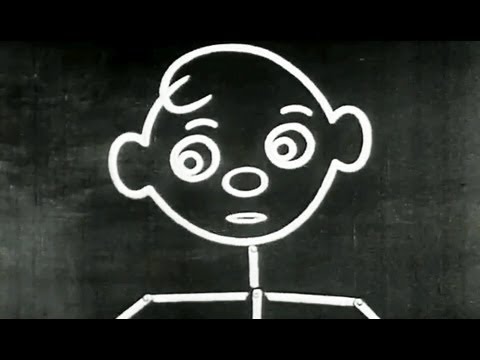more at
“CHALKY, A CARTOON CHARACTER, TEACHES LARRY ABOUT GOOD MANNERS IN SCHOOL.”
NEW VERSION with improved video & sound:
Public domain film from the Prelinger Archive, slightly cropped to remove uneven edges, with the aspect ratio corrected, and mild video noise reduction applied.
The soundtrack was also processed with volume normalization, noise reduction, clipping reduction, and/or equalization (the resulting sound, though not perfect, is far less noisy than the original).
Etiquette… is a code of behavior that delineates expectations for social behavior according to contemporary conventional norms within a society, social class, or group. The French word étiquette, literally signifying a tag or label first appeared in English around 1750…
Rules of etiquette
Rules of etiquette encompass most aspects of social interaction in any society, though the term itself is not commonly used. A rule of etiquette may reflect an underlying ethical code, or it may reflect a person’s fashion or status. Rules of etiquette are usually unwritten, but aspects of etiquette have been codified from time to time.
Manners
Manners involve a wide range of social interactions within cultural norms as in the “comedy of manners”, or a painter’s characteristic “manner”. Etiquette and manners, like mythology, have buried histories especially when they seem to have little obvious purpose, and their justifications as logical (“respect shown to others” etc.) may be equally revealing to the social historian. They are like laws in that they codify or set a standard for human behavior but there is no formal system for punishing transgressions, the main informal “punishment” being social disapproval. They are a kind of norm. What is considered “mannerly” is highly susceptible to change with time, geographical location, social stratum, occasion, and other factors…
Manners may include eating in a certain way, thanking people for things, and apologising for transgressions…
School discipline is the system of rules, punishments, and behavioral strategies appropriate to the regulation of children or adolescences and the maintenance of order in schools. Its aim is to control the students’ actions and behavior.
An obedient student is in compliance with the school rules and codes of conduct. These rules may, for example, define the expected standards of clothing, timekeeping, social conduct, and work ethic. The term discipline is also applied to the punishment that is the consequence of breaking the rules. The aim of discipline is to set limits restricting certain behaviors or attitudes that are seen as harmful or going against school policies, educational norms, school traditions, et cetera…
Theory
School discipline practices are generally informed by theory from psychologists and educators. There are a number of theories to form a comprehensive discipline strategy for an entire school or a particular class.
Positive approach is grounded in teachers’ respect for students. Instills in students a sense of responsibility by using youth/adult partnerships to develop and share clear rules, provide daily opportunities for success, and administer in-school suspension for noncompliant students. Based on Glasser’s Reality Therapy. Research (e.g., Allen) is generally supportive of the PAD program.
Teacher effectiveness training differentiates between teacher-owned and student-owned problems, and proposes different strategies for dealing with each. Students are taught problem-solving and negotiation techniques. Researchers (e.g., Emmer and Aussiker) find that teachers like the programme and that their behaviour is influenced by it, but effects on student behaviour are unclear.
Adlerian approaches is an umbrella term for a variety of methods which emphasize understanding the individual’s reasons for maladaptive behavior and helping misbehaving students to alter their behavior, while at the same time finding ways to get their needs met. Named for psychiatrist Alfred Adler. These approaches have shown some positive effects on self-concept, attitudes, and locus of control, but effects on behavior are inconclusive (Emmer and Aussiker). Not only were the statistics on suspensions and vandalism significant, but also the recorded interview of teachers demonstrates the improvement in student attitude and behaviour, school atmosphere, academic performance, and beyond that, personal and professional growth.
Appropriate school learning theory and educational philosophy is a strategy for preventing violence and promoting order and discipline in schools, put forward by educational philosopher Daniel Greenberg and practised by the Sudbury Valley School.

